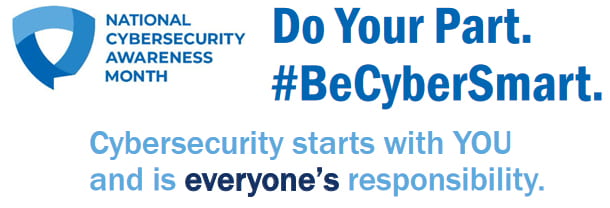
Internet-based devices are everywhere in our lives: at home, school, work and on the go. An “always-on” network gives us ways to create, connect, and share, but also presents opportunities for cybersecurity threats that can compromise our most sensitive personal information.
This week we look at some of the ways to help keep us and our information safe. Here are the key messages to “Own IT.”
Never Click and Tell: staying safe on social media
Share With Care – remember that what you post – if you let it – goes to the whole world.
- What you post can last a lifetime: Before posting online, think about what others might learn about you and who might see it in the future – teachers, parents, colleges and potential employers. Share the best of yourself online.
- Be aware of what’s being shared: Be aware that when you post a picture or video online, you may also be sharing information about others or personal details about yourself like where you live, go to school or hang out.
- Post only about others as you would like to have them post about you: The golden rule applies online as well. Ask permission before you tag a friend in a photo.
- Own your online presence: It’s OK to limit who can see your information and what you share. Learn about and use privacy and security settings on your favorite online games, apps and platforms.
Keep Tabs on Your Apps: best practices for apps on your devices
- Always lock your phone! If your phone gets lost or stolen, the first line of defense is a good lock. Whether that’s a few numbers, a swipe pattern, or your fingerprint, always put something between your data and someone trying to get to it – and set it to auto-lock when you put it down.
- Think twice if an app wants permission to use personal information (like your location) it doesn’t need before you say “OK.”
- Pay attention to how much access the app wants – does it want access to your camera? To your contacts list? To your file system? If so, why? Does a game really need your camera or access to the people you know? Make sure the app has a good reason for asking.
- Always use approved app stores for your apps. It’s not perfect, but apps from Apple and Google get checked for scams, viruses, malware far more than anywhere else.
Update Privacy Settings on your phone and on social
Mobile devices – including smartphones, laptops and wearables – are always within reach everywhere we go, and they share a lot of information about us and our habits. Check this link out to learn how to update your privacy settings on your phone and on the most popular online services to keep better control of your info: Managing Your Privacy
Our devices are a part of our lives, and it’s up to us to use them safely. If you ever have a question about any computer or device, please call the Helpdesk at x1047, or email at helpdesk@widener.edu. If you get a phishing or questionable email, please forward it to phish@widener.edu.
Study the NCSAM Guide for additional info on this and more cybersecurity concepts.

